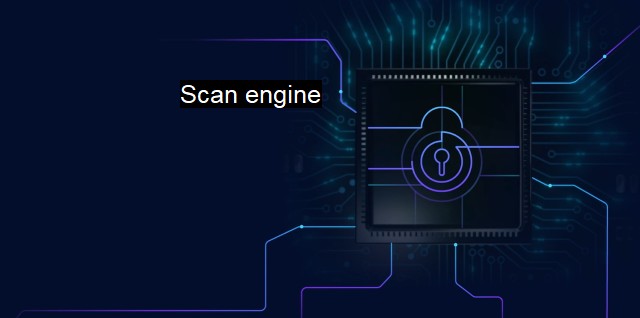What is Scan engine?
Exploring the Power of the Scan Engine: A Crucial Tool for Effective Antivirus Software in the Fight Against Cybercrime
In the scope of cybersecurity and antivirus programs, the term "Scan Engine" is one of the essential constituents often discussed. It plays a fundamental role in intelligence software and takings such cybersecurity solutions from functional to efficacious in safeguarding computer systems and networks from many harmful cyber threats.A Scan Engine, put simply, is a part of an antivirus program meticulously designed to recognize and neutralize detrimental threats to a computer system. this component refers to the mechanisms that it uses to scan and find potential threats.
The operating principles of Scan Engines are straightforward yet decidedly brilliant. As soon as the computer system is operational, the core function of the antivirus scanner, via its scan engine, springs into action – persistently scrupulous, persistently vigilant. In real-time, it scans the system and each and every file and byte executing over there while cross-verifying them against a comprehensive database of malware and virus definitions that the antivirus program arrives raring with. This database usually includes an exhaustive list of identified threats, ranging from recently discovered risks to older, more potent variants.
The introduction of newer malware and viruses compels programs to update their Scan Engines frequently to remain adequately armored against such threats. This is precisely why every antivirus has its scan engine which is given regular updates-invigorating the antivirus software with a more exhaustive database of threats.
Besides ensuring up-to-date threat definitions, the principles capacitate Scan Engines with heuristics-the refined decision-making affinity depicted by scanners that groom them in predicting novel threats and reacting with preparatory responses. It furnishes the Scan Engine an enhanced degree of autonomy, allowing it not just to discern harmful installations but to work better intuition towards comprehending instructions that could 'theoretically' become damaging in future.
In the wide range of cybersecurity solutions, the Scan Engine can take on different forms and adopt various ways to achieve its task of detecting threats. Some follow a signature-based approach where the engine probes for specific elements in each file that match the identified threat in the threat library. On the other hand, behavior-based scan engines embrace an execution scanning model that comprises observing the data in action, ensuring that the program maintains the functionality accuracy rate when neutralizing threats.
Scan Engines are also pivotal as the power behind efficiently executing tandem-type scans such as full system scans and quick scans. Full system scans involve a complete scan of every nook and cranny of the computer system whereas quick scans are precisely that-routine check-ups made easy, fast and less strenuously thorough. In this scenario, the actual Scan Engine’s calibration fine-tunes itself majestically, performing more efficiently for every separate scan type.
Scan Engines often employ cloud-based threat identification to ensure the risks are detected and dealt with as quickly as possible. With the growth of the Internet, the cloud provides an unparalleled level of convenience and instant response vis-à-vis risk apprehension and system protection.
Scan Engines are indispensable to the world of cybersecurity and antivirus solutions. Their importance hinges on how suavely they perpetuate the equilibrium of efficient system performance and uncompromised security. They safeguard user's digital life and maintain the healthy functioning of the system, applying necessary measures where the threat is detected. As the diverse cyber threats continue to escalate, so does the role of Scan Engines – to evolve innovatively, light-footedly, tirelessly, and using heuristics or behavioral scanning techniques – outlive, outsmart, outperform. Indeed, be the persistent, invincible warrior shield against precarious cyber threats for computer systems and users.

Scan engine FAQs
What is a scan engine in cybersecurity?
A scan engine in cybersecurity is a software component of an antivirus program that analyzes files for any malicious content such as viruses, trojans, and other malware.How does a scan engine work?
A scan engine works by using a combination of signature-based scanning and heuristic analysis to identify and classify suspicious files. Signature-based scanning checks for known malware and compares the file against a database of virus definitions. Heuristic analysis looks for suspicious behavior and other indicators of malicious code.What are the benefits of a scan engine?
The benefits of a scan engine include increased security, protection against malware threats, and improved system performance. Scan engines detect and remove malware before it can cause damage to your system, keeping your files and data safe. Regular scans can also prevent potential system slowdowns caused by malware infections.How often should I run a scan engine?
It is recommended to run a scan engine at least once per week to ensure continued protection against malware threats. However, if you frequently download files or visit suspicious websites, you may want to consider running a scan more often for added security.| | A | | | B | | | C | | | D | | | E | | | F | | | G | | | H | | | I | | | J | | | K | | | L | | | M | |
| | N | | | O | | | P | | | Q | | | R | | | S | | | T | | | U | | | V | | | W | | | X | | | Y | | | Z | |
| | 1 | | | 2 | | | 3 | | | 4 | | | 7 | | | 8 | | |||||||